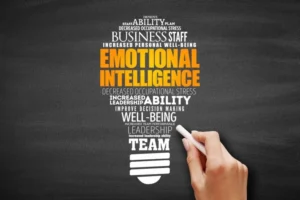The benefits of cultivating emotional intelligence are far-reaching, touching every aspect of our lives. Studies show that individuals with high EQ or EI are more likely to succeed in leadership roles, form positive relationships, and navigate challenges with resilience. Beyond the personal sphere, a society that values emotional intelligence is characterized by empathy, collaboration, and collective well-being.

Table of Contents
12 amazing Benefits of High Emotional Intelligence

1. Effective Communication:

High Emotional Intelligence (EI) elevates an individual’s communication skills to a remarkable level. Those with a keen understanding of their own emotions can articulate thoughts and feelings with clarity. Moreover, their ability to empathize enables them to grasp the emotional nuances conveyed by others. This heightened communication proficiency not only reduces the likelihood of misunderstandings but also fosters more meaningful and authentic connections in both personal and professional interactions.
2. Stronger Interpersonal Relationships:

High Emotional Intelligence forms the bedrock of successful interpersonal relationships. Individuals with high EI excel in navigating the complexities of social dynamics. Their capacity to understand and empathize with the emotions of others contributes to the formation of deeper, more positive connections. Whether in friendships, romantic relationships, or professional collaborations, those with high EI cultivate bonds that are characterized by trust, mutual understanding, and genuine emotional resonance.
3. Conflict Resolution:
High Emotional Intelligence individuals exhibit exceptional conflict resolution skills. When faced with disagreements, they approach conflicts with a calm and rational demeanor. Their ability to understand the emotions of all parties involved facilitates a nuanced and empathetic resolution process. This proficiency is invaluable in personal relationships, team dynamics, and workplace settings, fostering harmony and constructive problem-solving.
4. Leadership Effectiveness:
Effective leadership often goes hand in hand with high Emotional Intelligence. Leaders with elevated EI inspire and motivate their teams, creating a positive work environment. They possess the ability to understand and manage their own emotions, which in turn allows them to consider the emotional well-being of their team members. This holistic approach to leadership contributes to team cohesion, employee satisfaction, and overall organizational success.
5. Adaptability and Resilience:
One of the hallmark benefits of high EI is the ability to navigate change with grace. Individuals with elevated Emotional Intelligence exhibit a remarkable adaptability to new situations. Their emotional resilience equips them to face challenges with a positive mindset, effectively managing stress and uncertainty. This adaptability is a valuable asset in both personal and professional spheres, enhancing one’s capacity to thrive in diverse and dynamic environments.
6. Stress Management:
High Emotional Intelligence individuals excel in stress management. They possess a profound understanding of their own stressors and employ effective coping mechanisms to navigate challenging situations. Furthermore, their empathetic nature allows them to provide valuable emotional support to others during stressful times. This combination of self-awareness and interpersonal skills creates a more resilient and supportive social ecosystem.
7. Increased Empathy:
Empathy, a cornerstone of Emotional Intelligence, deepens connections with others. High EI individuals have an enhanced ability to understand and share the feelings of those around them. This heightened sense of empathy fosters a sense of community, cooperation, and understanding. It lays the foundation for positive relationships and contributes to a more compassionate and inclusive social environment.
8. Enhanced Decision-Making:
High Emotional Intelligence significantly contributes to sound decision-making. Individuals with high EI integrate both rational and emotional considerations into their decision-making processes. This comprehensive approach results in well-balanced and thoughtful choices, ensuring that decisions align with both personal values and the broader impact on individuals and groups.
9. Career Success:
In the professional realm, high Emotional Intelligence is a powerful catalyst for career success. The ability to navigate workplace relationships, communicate effectively, and lead teams with emotional intelligence distinguishes individuals in leadership positions. This skill set is particularly valuable in collaborative work environments, contributing to both personal career advancement and the overall success of the organization.
10. Improved Mental Health:

A robust link exists between high EI and improved mental health. Individuals with a strong grasp of their emotions and effective emotional regulation are less susceptible to stress, anxiety, and depression. Their ability to maintain a positive outlook on life and navigate challenges with resilience contributes to overall mental well-being.
11. Positive Influence on Others:
High Emotional Intelligence individuals often serve as positive role models within their communities and workplaces. Their emotional resilience, interpersonal skills, and ability to navigate challenges inspire others to adopt similar behaviors. This positive influence contributes to the development of a more emotionally intelligent collective, fostering a culture of empathy, understanding, and support.
12. Customer Relations:
In customer-facing roles, high Emotional Intelligence is a valuable asset. Understanding and responding to the emotions of customers contribute to improved satisfaction and loyalty. Individuals with high EI can establish rapport, navigate conflicts with customers effectively, and ensure positive interactions that enhance the overall customer experience.

Conclusion:
High Emotional Intelligence emerges as a powerful and versatile tool that not only enriches personal experiences but also significantly contributes to success in various professional and social contexts. Investing in the development of Emotional Intelligence is an investment in one’s ability to navigate the intricacies of human interactions, leading to a more fulfilling and harmonious life. This multifaceted skill set enhances not only individual well-being but also the quality of relationships and the overall dynamics of the communities we engage with.







